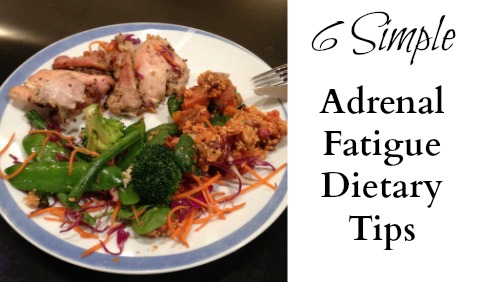 Adrenal fatigue creates the need to eat in a unique way while the body heals. This may not be the way that you eat forever, but there needs to be some differences while you support yourself back to health.
Adrenal fatigue creates the need to eat in a unique way while the body heals. This may not be the way that you eat forever, but there needs to be some differences while you support yourself back to health.
A big part of healing adrenal fatigue, is to learn to live every aspect of your life in a way that is empowering for you, and this includes your approach to your diet. We are all such unique individuals, and we all have unique consitutions. What food is right for one person, is not necessarily right for another.
Here are 6 simple adrenal fatigue dietary tips for you to help you find a rhythm that is right for you.
1. Eat breakfast within 30-60 minutes of waking up.
The most important reason for this from an adrenal fatigue perspective is because blood sugar regulation is often compromised. The stress in your life has affected the way that stress hormones like cortisol are released from your adrenal glands. One of the functions of cortisol is blood sugar regulation.
Start your day with protein, complex carbs and fats (healthy ones like avocados or coconut oil). Get creative with the foods that are right for your body.
2. Eat regularly, every 2-4 hours.
Don’t skip any meals, and be sure to add snacks between meals, again to keep your blood sugars stable. The more severe your symptoms of stress, the more severe your issues with blood sugar stability are likely to be. Make sure you include protein, complex carbs and fats with every meal and snack. Again, find the types of foods that work for your unique consitution.
3. Take a snack with you EVERYWHERE you go.
You don’t want to find yourself out somewhere, suddenly hungry and with no good food to be found. I would often take a smoothie with me that included protein powder in it (I use Vital Protein) or some nuts.
In a worst case scenario, I would try and find a protein bar to buy, but the hidden ingredients in these products were very often not a match for my stressed gut. A lot of these products contain whey protein, which is a dairy derivative and you may find that with increased stress, that you have increased sensitivity to dairy.
4. Include cooked food as part of your diet.
While raw food is extremely beneficial for the body for many reasons, eating a primarily raw diet while dealing with adrenal fatigue can actually create a further drain on your system.
How you balance the raw and cooked foods in your diet will depend on the severity of your symptoms. The more severe your symptoms, the more you will need foods that are warming, gentle and soothing on your system. Bone Broth soups that include some protein are a great example of something that can help to nurture your system while you are feeling depleted.
5. Avoid eating sugary snacks late at night.
I definitely recommend that you work with releasing sugar from your diet as this plays havoc with your gut and blood sugar levels while dealing with adrenal fatigue. I understand that this can be a process as sugar is so addictive for many of us.
The most important time to leave the sugar out is before you go to bed. Spiking your blood sugars late at night will greatly affect your ability to stay asleep and also the quality of your sleep. Instead, have a good meal 2-3 hours before going to bed which includes protein, complex carbohydrates like sweet potato or some quinoa (quinoa is a wonderfully calming food) and some fats.
This provides the best balance for your blood sugar levels, and will help to keep them balanced during the night. The imbalance in blood sugar levels is one of the most common reasons for a disturbed sleep while dealing with adrenal fatigue.
Have a small snack 30 minutes to an hour before going to bed with more quality protein, complex carbs and fats. A little left over dinner or perhaps some hommus and veggies and a few nuts.
I made the mistake recently (and many times in the past!!!) of eating some ice-cream (something I rarely do) one night after an emotional upset (yes I’m human!). Oh boy, it sent me on a total roller coaster of brain fog, unbalanced blood sugars and not sleeping properly for many days.
The joy of the sugary treat is not worth it for the consequence of symptoms that you will likely have to deal with. You can deal with this much more easily in a healthy body, but with a stressed body, na-ah, no way. Your body simply will not tolerate it.
6. If invited out, ask what meal will be served.
It’s so important to speak up and say what you need. If you are clear on what works for you and what doesn’t, speak to your host and ask if they can make something unique for you or offer to bring your own meal or added extras to the meal. Make every effort to address this beforehand, and no you are not making a fuss! The only fuss will be in eating food that is not right for your body and having to deal with the consequences afterwards.
Learning what dietary needs are appropriate for you, need to be centred around these above guidelines. The most important thing is to adjust these for your own unique body to help give you the best chance of balancing out your physical body.
You can do this.
Best wishes,
Lisa.
